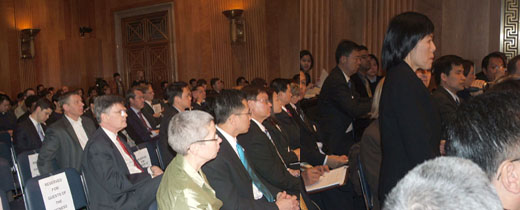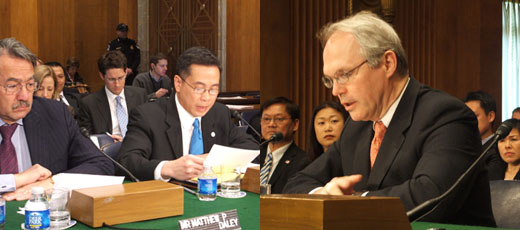Chairman, Viet Tan
Testimony before the Senate Foreign Relations Committee
Subcommittee on East Asian and Pacific Affairs
Hearing on “The United States and Vietnam: Examining the Bilateral Relationship”
March 12, 2008
Madam Chairwoman and Members of the Committee,
Thank you for the invitation to testify today. I am here on behalf of Viet Tan, an unsanctioned pro-democracy party active in Vietnam. The goal of Viet Tan is to work alongside other Vietnamese democratic forces to bring about peaceful, non-violent political change through the power of the people. We believe that a free society is the best means to harness the tremendous potential of Vietnamese citizens and that a democratic Vietnam would be an anchor for prosperity and stability in Asia.
I would like to focus first on the current situation in Vietnam, next on the challenge and opportunity facing us, and last on specific recommendations.
Current Situation in Vietnam
There are two important developments: a surge in social discontent and an emboldened challenge to one-party rule.
First, due to pervasive corruption, social discontent has risen to an unprecedented level. This is shown by widespread protests by farmers and labor unrest. For almost two years, farmers have staged numerous protests to demand fair compensation for land lost to corrupt officials. The most significant event was the 27 days protest in Saigon last summer by thousands of people before the police forcibly removed them. Workers also have walked out by the thousands in hundreds of strikes. More recently, the Catholic community joined in when thousands of followers protested from December 2007 into January of this year demanding the return of confiscated church properties in Hanoi. Meanwhile, the government continues to arbitrarily arrest those suspected of leading the protests and harassing others who participated. However, so far this has failed to prevent new protests from taking place.
On the political front, the democracy movement in Vietnam today is similar to Czechoslovakia during the 1970s and Poland in the 1980s. For the first time, the movement no longer consists of individuals but organized groups with increasing popular support. Since 2006, dozens of political parties and grassroots associations have sprung up to challenge one-party rule. The government retaliated in February 2007 when they unleashed the worst crack down in the last 20 years.
Scores of democracy leaders have been imprisoned; others put under house arrest or subjected to constant harassment by the police. Although battered by the crack down, these groups are still hanging on and building coalitions from both overseas and inside Vietnam.
Recently, on November 17, 2007, three members of my party, Viet Tan, were arrested in Vietnam along with three associates for attempting to publicize non-violent principles and methods to the people. Among the arrested are two American citizens. Mr. Leon Truong of Hawaii was later released in December, but Dr. Nguyen Quoc Quan of California is still in prison today. Just last week, his wife’s visa to Vietnam was retracted despite her plea to visit her husband. Mrs. Nguyen Quoc Quan is at the hearing today as a vivid reminder that the Vietnamese people are still living under a brutal and dictatorial regime. I also would like to take this opportunity to express our appreciation to members of Congress, State Department officials, Ambassador Michael Michalak and his staff for maintaining constant pressure on the Vietnamese government for the release of Dr. Nguyen Quoc Quan and other Viet Tan colleagues who were detained.
It is clear that what is happening in Vietnam is very unusual and significant. After more than 50 years in power, for the first time, the Vietnamese Communist Party is facing numerous and unprecedented challenges to its rule. The desire for real changes in Vietnam is stronger now than ever before. In response, the regime is using terror tactics to silence opposition, and severely violate human rights of not just political dissidents but also bloggers, farmers, workers, students or whoever dares to question the regime’s authority.
Challenge and Opportunity
The democracy movement in Vietnam is facing a huge challenge: that is to survive the crackdown at all costs. And by overcoming the challenge, a tremendous opportunity also exists.
If the movement can survive the next year or two, it will prove to the Vietnamese people that:
1. There is a viable alternative that can withstand the persecution and continues to challenge the regime, and
2. Fear can be overcome for the ruling dictatorship is not as invincible as it claims.
And that will lead to a tipping point to accelerate real democratic changes.
For the United States, an excellent opportunity also exists because:
1. A democratic Vietnam will be a much more reliable partner in the long run on both economic and security fronts, especially in dealing with China.
2. A victory for democracy in Vietnam will have a tremendous impact on political openness and respect for human rights throughout the region.
Recommendations
The choice for American policy is not whether to isolate or engage Vietnam, but how to pursue the bilateral relationship in the most constructive way. To deepen America’s relationship with the Vietnamese people, I would like to offer three recommendations:
1. Send the Vietnam Human Rights Act to President Bush for his signature
Last September, the House of Representatives overwhelmingly passed the Vietnam Human Rights Act (H.R. 3096). This result was warmly welcomed by the Vietnamese American community and democracy activists inside Vietnam. In a letter thanking the House, the Vietnambased Alliance for Democracy and Human Rights stated:
“The fraternal and economic relationship between Vietnam and the United States is only sustainable and benefiting the peoples of the two countries when Vietnam is truly a democratic nation where human rights are respected.”
We strongly urge you to pass this important legislation in the Senate.
2. Speak out on the human rights abuses in Vietnam
Your voices—in today’s hearing, through letters, speeches on the Senate floor, and in meetings with Hanoi officials—are important in demanding that the regime release all political prisoners and cease all forms of harassment against democracy activists and their families. We ask you to particularly focus on the following cases:
· Father Nguyen Van Ly, attorney Nguyen Van Dai, and attorney Le Thi Cong Nhan.
· Imprisoned members of the Vietnam Progression Party, People’s Democratic Party, Vietnam Populist Party, and United Workers-Farmers Organization.
· Dr. Nguyen Quoc Quan and three associates of Viet Tan: Somsak Khunmi, Nguyen The Vu, and Nguyen Viet Trung.
3. Support democratic change
As long as there is a one-party dictatorship, human rights abuses will persist. The solution to human rights is a democratic society where all stake-holders have a voice in the future of their country. While achieving democracy must be foremost an effort of the Vietnamese people, the international community can help by enabling the activities of independent NGOs, promoting an independent media and collaborating with grassroots organizations inside Vietnam. This is essential for empowering the Vietnamese people and building a civil society, the critical foundation upon which a long lasting democracy can be achieved.
Once again, thank you for holding this hearing and for your continued support for democracy and human rights in Vietnam.









